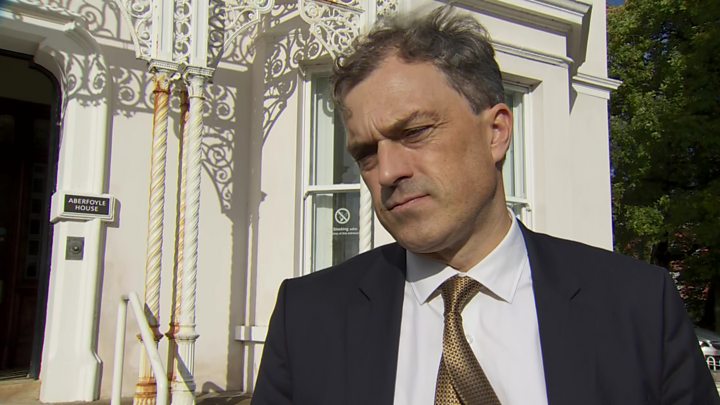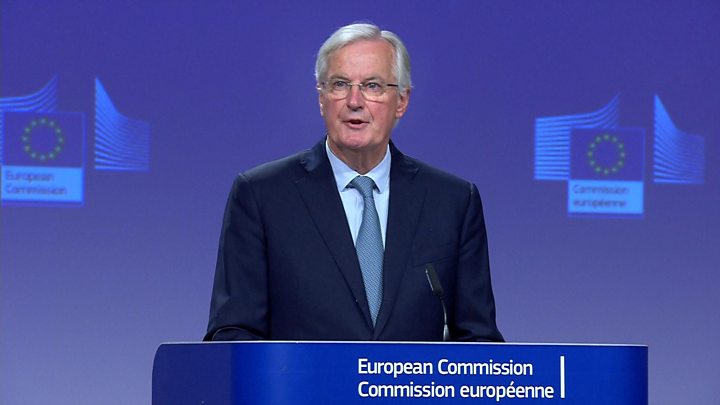
Media playback is unsupported on your device
A Brexit deal has been agreed between UK and EU negotiating teams before a meeting of European leaders in Brussels.
Prime Minister Boris Johnson tweeted: "We've got a great new deal that takes back control."
The two sides have been working on the legal text of a deal, but it will still need the approval of both the UK and European parliaments.
BBC chief political correspondent Vicki Young says the DUP will not support it.
She said senior DUP MPs have met in the Commons to discuss the deal, but will not vote for it.
Labour leader Jeremy Corbyn said the deal sounded "even worse" than what was negotiated by the PM's predecessor, Theresa May, and "should be rejected" by MPs.
But European Commission President Jean-Claude Juncker said it was a "fair and balanced agreement".
Both he and Mr Johnson have urged their respective parliaments to back the deal.
No 10 sources have told the BBC's political editor Laura Kuenssberg that Mr Johnson will later ask EU leaders to reject requests for an extension to the Brexit deadline of 31 October.
MPs passed a law in September that requires the PM to request an extension on 19 October if Parliament has not agreed a deal or backed leaving without a deal by that date.
MPs will later vote on whether to hold an extra sitting in the Commons on Saturday to discuss the next steps.
Cabinet Office minister Michael Gove said if the sitting was approved, the government would hold a vote on the deal.
He said he was "not contemplating defeat", but if the plan did not get the backing of MPs, the alternative was leaving without a deal.
What is in the deal?
Mr Johnson's proposals for a new Brexit deal hinged on getting rid of the controversial backstop - the solution negotiated between Theresa May and the EU to solve issues around the Irish border after the UK leaves.
By removing it, he hoped to secure the support of Brexiteers in his own party and the DUP - which could hold the key to getting the numbers for a successful vote in the Commons.
The EU's chief negotiator, Michel Barnier, said the new deal rests on four main elements, that:
- Northern Ireland will remain aligned to a limited set of EU rules, notably related to goods
- Northern Ireland will remain in the UK's customs territory, but will "remain an entry point" into the EU's single market
- There is an agreement to maintain the integrity of the single market and satisfy the UK's VAT concerns
- Northern Ireland representatives will be able to decide whether to continue applying union rules in Northern Ireland or not every four years
Mr Barnier told a press conference in Brussels that the final point - allowing for votes in the Northern Ireland Assembly - was "a cornerstone of our newly agreed approach".
The decision would be based on a simple majority, rather than requiring a majority of both unionists and nationalists to support the rules in order for them to pass.

Media playback is unsupported on your device
Chris Morris from BBC Reality Check said another key part of the deal was text saying Northern Ireland would be part of a United Kingdom customs union - "in other words, Northern Ireland will leave the European customs union and it will be part of new trade deals done around the world".
But, he said, this move creates a "de facto border down the Irish Sea for customs and goods", and that in turn will be seen as "an impediment to trade" in the UK, especially by the DUP.
The DUP has been in an agreement with the Conservative Party since the 2017 election, which, in the past, gave the government a working majority.
But after resignations and the removal of the party whip from more than 20 Tory MPs in recent weeks, Mr Johnson now could face a tough battle to get his deal through Parliament.
Mr Barnier said he and Mr Juncker had been told by the PM "he has faith in his ability to convince the majority he needs in the House of Commons".
Is this gamesmanship on the part of Boris Johnson? I surmise he is really trying to turn up the heat on the DUP to get them on board.
But we are heading towards show-time when the PM brings back his deal to the Commons.
There are a lot of MPs who will be unhappy that he is rushing Parliament into a vote when they haven't had the text to study what they're voting for.
There's another emerging battle too as we learnt the Labour Party is increasingly likely to back a so-called confirmatory referendum - meaning they would only approve the deal if it was put to a referendum.
But one thing I've been told is that Boris Johnson will not hold a vote on his deal unless he's confident of winning it.
So we are heading for one humungous showdown.
Leader of the Commons and Brexit supporter Jacob Rees-Mogg said it was a "really exciting day today in British politics" as he urged MPs to "rally round this great deal".
He told the Commons: "It is a really exciting and positive deal - it removes the undemocratic backstop [and] it will ensure we are one, single customs territory."
But fellow Brexit backer and leader of the Brexit Party, Nigel Farage, called for it to be rejected by Parliament.
"It's just not Brexit," he told the BBC. "If this was to be agreed to we then enter into years more negotiations."
He said the deal meant "we will not be making our own laws in our own country" and said the treaty "binds us in to other commitments".
The leader of the Liberal Democrats, Jo Swinson, also condemned the deal as "bad for our economy, bad for our public services, and bad for our environment".
The pro-Remain MP said the "fight to stop Brexit is far from over", adding: "The next few days will set the direction of our country for generations, and I am more determined than ever to stop Brexit."
Do you have any questions about the proposed Brexit deal?
In some cases your question will be published, displaying your name and location as you provide it, unless you state otherwise. Your contact details will never be published. Please ensure you have read the terms and conditions.
Use this form to ask your question:
If you are reading this page on the BBC News app, you will need to visit the mobile version of the BBC website to submit your question on this topic.
https://www.bbc.com/news/uk-politics-50079385
2019-10-17 11:15:00Z
52780406083772
Tidak ada komentar:
Posting Komentar